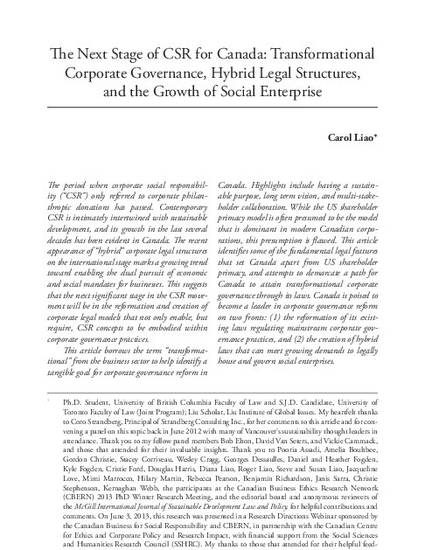
- corporate law,
- corporate governance,
- corporate social responsibility,
- shareholder primacy,
- BCE,
- Peoples,
- team production theory,
- hybrid,
- social enterprise,
- co-operative ownership,
- community interest company,
- community contribution company,
- benefit corporation,
- transformational,
- Canada,
- US,
- UK
The period when corporate social responsibility (CSR) only referred to corporate philanthropic donations has passed. Present day CSR is intimately intertwined with sustainable development, and its growth in the last several decades has been evident in Canada. The recent appearance of “hybrid” corporate legal structures on the international stage marks a growing trend toward enabling the dual pursuit of economic and social mandates for businesses. It suggests that the next significant stage in the CSR movement will be in the reformation and creation of corporate legal models that not only enable, but require, CSR concepts to be embodied within corporate governance practices.
While the US shareholder primacy model is often presumed to be the model that is dominant in modern Canadian corporations, this presumption is flawed. This article identifies some of the fundamental legal features that set Canada apart from US shareholder primacy, and attempts to demarcate a path for Canada to attain transformational corporate governance through its laws. The term “transformational” is borrowed from the business sector to help identify a tangible goal for corporate governance reform in Canada. Highlights include having a sustainable purpose, long term vision, and multi-stakeholder collaboration. Canada is poised to become a leader in corporate governance reform on two fronts: through the reformation of its existing laws regulating mainstream corporate governance practices, and in the creation of hybrid laws that can meet growing demands to legally house and govern social purpose businesses and enterprises.
There has been much fanfare surrounding the possible implementation of a hybrid similar to the US “benefit corporation” in Canada in order to address growing for-profit sector needs to pursue social value in addition to profit-making. However, some of the fundamental legal characteristics within the benefit corporation actually parallel existing common laws in Canada regarding mainstream corporate governance practices. Canada does not need to adopt American solutions to American problems. During these formative years of Canada’s corporate legal development, it is critical that the nation’s progressive legal stance is properly understood and taken into account when establishing hybrid laws so as not to confuse and/or jeopardize that stance. An ongoing stream of thoughtful and intelligent commentary is needed to address and advance Canadian corporate legal needs for social progress, as well as the establishment of innovative new hybrid laws that can bridge the gap between for-profit and non-profit sectors.
